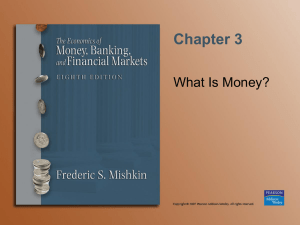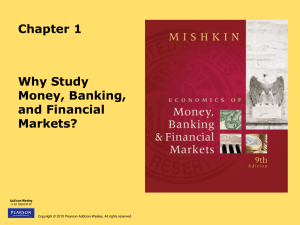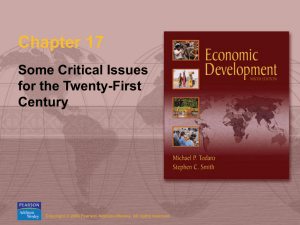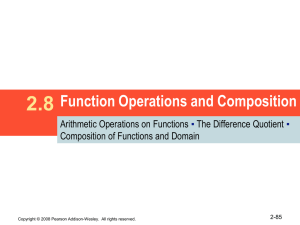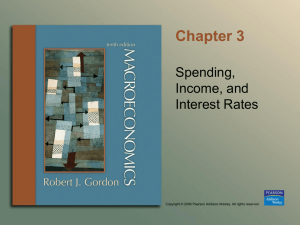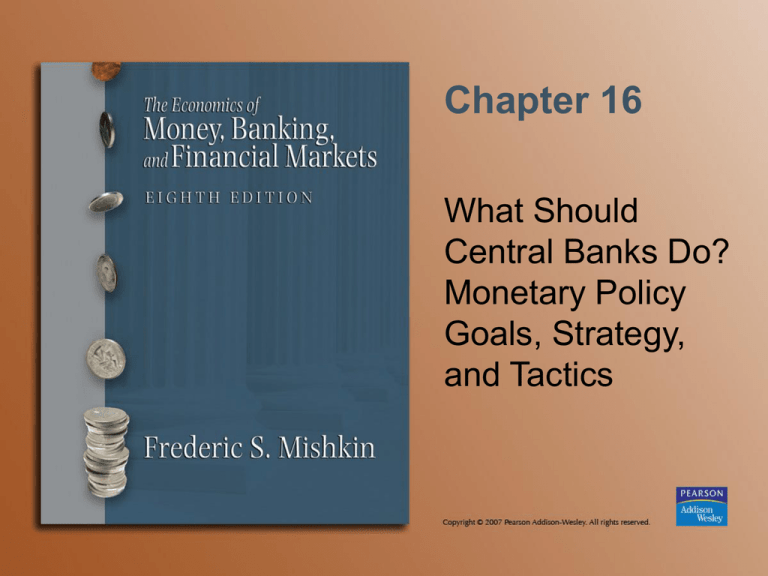
Chapter 16
What Should
Central Banks Do?
Monetary Policy
Goals, Strategy,
and Tactics
The Price Stability Goal
• Low and stable inflation
• Inflation
Creates uncertainty and difficulty in planning
for future
Lowers economic growth
Strains social fabric
• Nominal anchor
• Time-inconsistency problem
Copyright © 2007 Pearson Addison-Wesley. All rights reserved.
16-2
Other Goals of Monetary Policy
• High employment
• Economic growth
• Stability of financial markets
• Interest-rate stability
• Foreign exchange market stability
Copyright © 2007 Pearson Addison-Wesley. All rights reserved.
16-3
Should Price Stability be the
Primary Goal?
• In the long run there is no conflict
between the goals
• In the short run it can conflict with
the goals of high employment and
interest-rate stability
• Hierarchical mandate
• Dual mandate
Copyright © 2007 Pearson Addison-Wesley. All rights reserved.
16-4
Monetary Targeting
• Flexible, transparent, accountable
• Advantages
Almost immediate signals help fix inflation
expectations and produce less inflation
Almost immediate accountability
• Disadvantages
Must be a strong and reliable relationship
between the goal variable and the targeted
monetary aggregate
Copyright © 2007 Pearson Addison-Wesley. All rights reserved.
16-5
Inflation Targeting I
• Public announcement of medium-term
numerical target for inflation
• Institutional commitment to price stability as
the primary, long-run goal of monetary policy
and a commitment to achieve the inflation goal
• Information-inclusive approach in which many
variables are used in making decisions
• Increased transparency of the strategy
• Increased accountability of the central bank
Copyright © 2007 Pearson Addison-Wesley. All rights reserved.
16-6
Inflation Targeting II
• Advantages
Does not rely on one variable to achieve target
Easily understood
Reduces potential of falling in
time-inconsistency trap
Stresses transparency and accountability
• Disadvantages
Delayed signaling
Too much rigidity
Potential for increased output fluctuations
Low economic growth during disinflation
Copyright © 2007 Pearson Addison-Wesley. All rights reserved.
16-7
Copyright © 2007 Pearson Addison-Wesley. All rights reserved.
16-8
Copyright © 2007 Pearson Addison-Wesley. All rights reserved.
16-9
Copyright © 2007 Pearson Addison-Wesley. All rights reserved.
16-10
Implicit Nominal Anchor
• Forward looking and preemptive
• Advantages
Uses many sources of information
Avoids time-inconsistency problem
Demonstrated success
• Disadvantages
Lack of transparency and accountability
Strong dependence on the preferences, skills, and
trustworthiness of individuals in charge
Inconsistent with democratic principles
Copyright © 2007 Pearson Addison-Wesley. All rights reserved.
16-11
Copyright © 2007 Pearson Addison-Wesley. All rights reserved.
16-12
Tactics:
Choosing the Policy Instrument
• Tools
Open market operation
Reserve requirements
Discount rate
• Policy instrument (operating instrument)
Reserve aggregates
Interest rates
May be linked to an intermediate target
• Interest-rate and aggregate targets
are incompatible
Copyright © 2007 Pearson Addison-Wesley. All rights reserved.
16-13
Copyright © 2007 Pearson Addison-Wesley. All rights reserved.
16-14
Copyright © 2007 Pearson Addison-Wesley. All rights reserved.
16-15
Criteria for
Choosing the Policy Instrument
• Observability and Measurability
• Controllability
• Predictable effect on Goals
Copyright © 2007 Pearson Addison-Wesley. All rights reserved.
16-16
The Taylor Rule, NAIRU,
and the Phillips Curve
Federal funds rate target =
inflation rate equilibrium real fed funds rate
1/2 (inflation gap) 1/2 (output gap)
• An inflation gap and an output gap
Stabilizing real output is an important concern
Output gap is an indicator of future inflation as shown by
Phillips curve
• NAIRU
Rate of unemployment at which there is no tendency for
inflation to change
Copyright © 2007 Pearson Addison-Wesley. All rights reserved.
16-17
Copyright © 2007 Pearson Addison-Wesley. All rights reserved.
16-18

